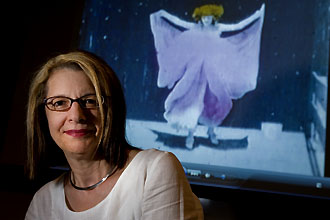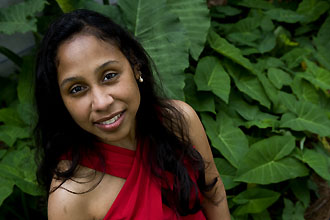Best in the Class
Confidence and critical thinking these are the attributes and skills that Constance Balides and Nghana Lewis say they aim to develop in their students. Balides, associate professor of communication, and Lewis, associate professor of English and African and African diaspora studies, are this year's recipients of the university's highest honor for undergraduate teaching.

Constance Balides, associate professor of communication and director of film studies, says that she is especially pleased to receive the Weiss award because the selection process begins with students' nominations. (Photos by Paula Burch-Celentano)
The 2010 Suzanne and Stephen Weiss Presidential Fellowships were announced at the commencement ceremony on Saturday (May 15).
"Confidence is not something you just have," says Balides, director of film studies at Tulane. Confidence comes when you push yourself "past a limit into an unknown zone, into the next level of sophistication in your thinking."
The challenges that she gives her students, Balides says, "help them develop confidence so that when they go out into the world, they're equipped to pursue what they want to pursue because they've already had successes."
Students usually come to film studies because they like to watch movies, but they quickly learn in Balides' classes that film studies demands intensive reading and in-depth analysis.
"Cinema matters," says Balides, "because it is a way that culture talks about itself. What I feel that we're doing in our classes is giving students a conceptual language to understand how film works."

Nghana Lewis, associate professor of English and director of African and African disapora studies, says that it's important once in awhile to take a step back to reassess one's teaching philosophy.
Critical thinking and writing are central to what Nghana Lewis teaches. Literary studies and critical race theory are her areas of expertise. She is the director of the African and African diaspora studies program at Tulane.
Lewis earned her bachelor of arts from Tulane in 1994. She attributes much of how she approaches teaching to observations of her professors, who in some cases are her colleagues now.
"I'm still learning from them. What I expect of my students is consistent with what was expected of me."
Lewis' goal is for her students to understand that "the university is a place where we generate ideas, and we're encouraged to think broadly."
But creativity and free-thinking in themselves are not the end destination in education, says Lewis. "The end is being able to practically take that knowledge and apply it to the world."
